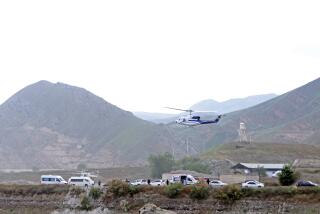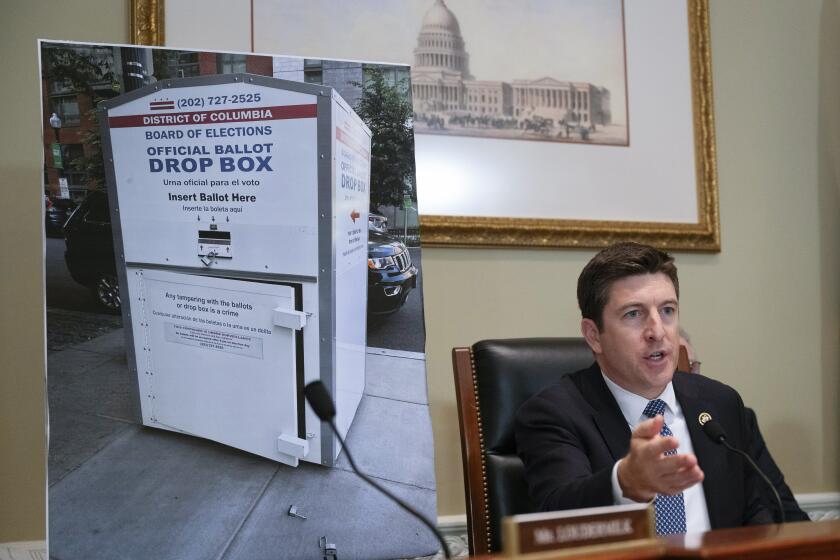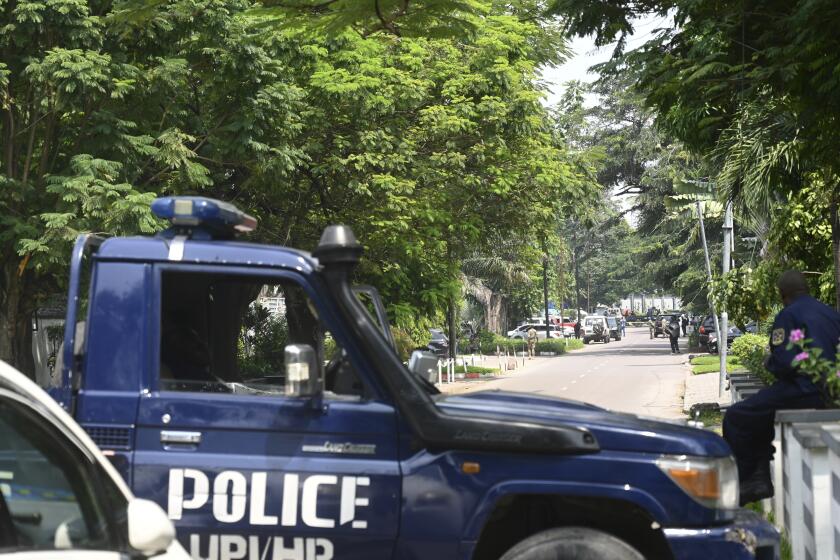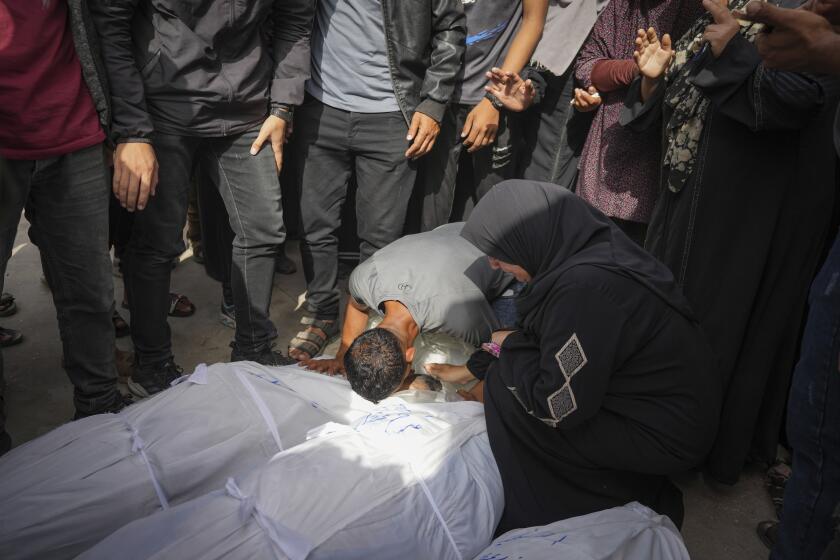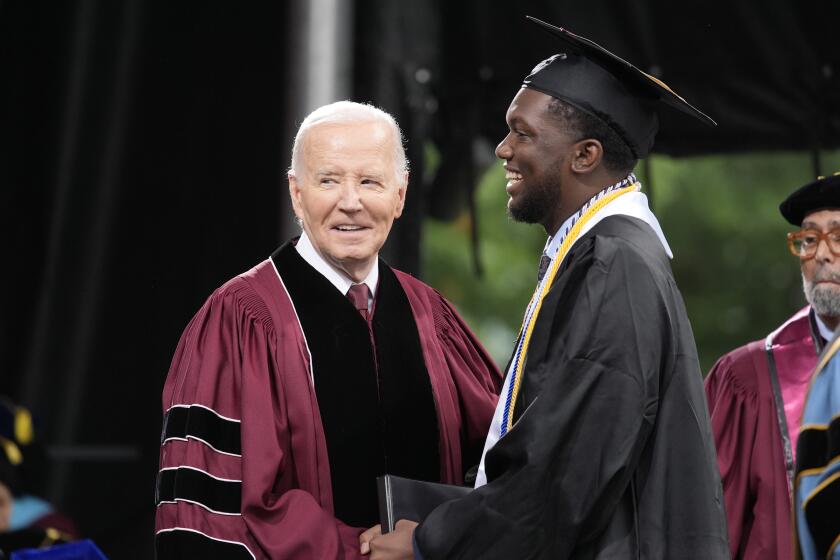12 guilty in murder of Serbian premier
Slobodan Milosevic’s feared paramilitary commander was found guilty Wednesday in the 2003 murder of pro-Western Prime Minister Zoran Djindjic, an assassination that shocked the nation and damaged the cause of democratic reform.
Milorad Ulemek, former head of the notorious Red Berets, his deputy and 10 other men were convicted of planning and carrying out the murder of Serbia’s first democratically elected prime minister since World War II.
The killing was a bid to return Milosevic’s allies to power and halt Belgrade’s cooperation with the international war crimes tribunal at The Hague, the Serbian court said.
Djindjic became prime minister at a crucial time in Serbian history, elected after he helped topple Milosevic from power in 2000. The charismatic and popular Djindjic, 50, was killed after he extradited the former Serbian strongman to The Hague, where Milosevic died last year of a heart attack while on trial for crimes against humanity.
Serbia’s attempts to rehabilitate itself after the Milosevic years of isolation and ostracism have been fitful, with noteworthy progress often met by nationalist resistance.
Concluding a long and complex prosecution that has riveted and polarized Serbia, a panel of judges handed especially stiff jail terms to Ulemek, convicted of masterminding the murder, and his deputy, Zvezdan Jovanovic, convicted of pulling the trigger of the sniper’s rifle used to shoot Djindjic.
The prime minister was slain March 12, 2003, as he arrived at the main government building in downtown Belgrade, walking on crutches.
“This was a political murder, a criminal deed aimed against the state,” presiding Judge Nata Mesarovic said as she read the verdict to a packed courtroom. Observers in the court included Serbian President Boris Tadic and several former top officials in the Djindjic government.
Djindjic was killed “after democratic changes in Serbia, when most of the citizens believed that the situation in Serbia could be changed and life could be better,” the judge said.
Ulemek and Jovanovic were sentenced to 40 years in prison, the maximum under Serbian law, and the other defendants received sentences of between eight and 35 years.
Ulemek smiled slightly while Jovanovic held a steady smirk. Then, in the middle of the judge’s reading, they and their convicted accomplices stood up and walked out of the courtroom.
Later, outside the courthouse, the defendants’ families and friends were met by several thousand youthful members of Djindjic’s Democratic Party and other pro-democracy activists, who booed and hurled shouts of “Killer!”
All defense attorneys said they would appeal.
The trial lasted 3 1/2 years and saw the killing of two prosecution witnesses, the resignation of a judge and threats against the current lead judge, as well as a string of technical hurdles placed by the previous conservative government of Prime Minister Vojislav Kostunica. The prime minister was reelected this month after forming a coalition with Djindjic’s party.
As important as the proceedings were to Serbia’s ability to air political crimes and mete out justice, many Djindjic supporters said they believed the full roster of masterminds behind the murder had not been revealed. Several people appeared at the courthouse with signs saying, “It’s not over!”
“It is not over until we get full answers to the question of who issued the orders for this killing, who organized it, and why the obstruction” and delays were caused by the previous government, said Cedomir Jovanovic, head of the Liberal Democratic Party and an ally of Djindjic.
He added that Kostunica should have been required to testify.
The Red Berets, as Milosevic’s Unit for Special Operations was known, was an elite and secretive paramilitary squad that terrorized non-Serbs in much of Bosnia-Herzegovina and Croatia during the Balkan wars of the 1990s.
After the wars, they morphed into a criminal organization accused of killings and kidnappings for profit, often targeting Milosevic’s enemies.
In fact, the untangling of the murky web of war crimes and common crimes in the Serbian underworld may be another achievement of this trial, politicians said.
“With this [verdict] we are finally seeing the start of the showdown with organized crime, and the background of that crime,” said Dragoljub Micunovic, the founder of Djindjic’s party.
Ulemek, 39, previously was convicted of the 2000 murder of a key Milosevic rival, former President Ivan Stambolic, and the attempted murder of ano
ther Milosevic foe, opposition leader Vuk Draskovic.
He maintained his innocence in the Djindjic trial, appearing in court at one point wearing a T-shirt emblazoned with a howling wolf in a red beret.
The defense attorney for Ulemek’s deputy, Jovanovic, said the trial was a “crematorium of justice.”
On the eve of the verdict, a major boulevard in Belgrade recently named in honor of Djindjic was plastered with fake street signs bestowing a new name: “Ratko Mladic,” for the wartime Bosnian Serb army commander wanted by The Hague on war crimes charges.
The substitution of Mladic’s name for Djindjic’s reflected the serious division within Serbian society that was underscored by the trial.
“Gen. Mladic and Prime Minister Djindjic symbolize two possible ways forward for Serbia,” said political analyst Cedomir Antic. “One symbolizes the Serbia of reforms and the other symbolizes the Serbia that would like to keep fighting for national unification,” as in the wars of the 1990s.
“One might ask how can any reasonable person treat Mladic as a hero or liberator,” he said. “Today’s verdict, as well as many other events, are leading us toward moderation.”
*
Special correspondent Cirjakovic reported from Belgrade and Times staff writer Wilkinson from Rome.
More to Read
Start your day right
Sign up for Essential California for news, features and recommendations from the L.A. Times and beyond in your inbox six days a week.
You may occasionally receive promotional content from the Los Angeles Times.
